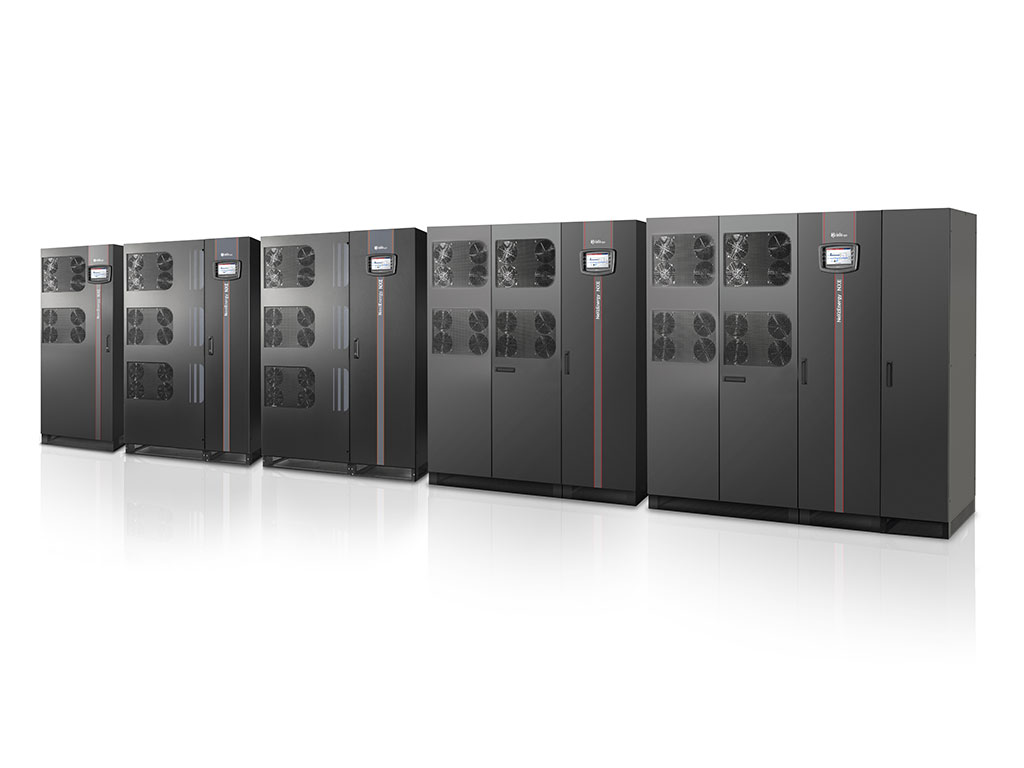Colocation
Colocation
Data Centres
Infrastructure Management
Security
Software & Applications
Riello UPS extends NextEnergy range with 600 kVA version
Riello UPS upgrades its NextEnergy (NXE) series with a new 600 kVA model. The NXE 600 is designed to protect larger data centres including hyperscale or colocation facilities and is capable of powering parallel installations up to a massive 4.8 MVA.
It joins the series’ already
popular 250-300-400-500 kVA versions and shares the same advanced
transformer-free technologies that enable it to deliver unity power (kW = kVA)
and TÜV-certified operational efficiency up to 97% in online UPS mode.
With front to top ventilation and
full front access for maintenance eliminating the need for rear clearance, the
NextEnergy range offers operators fantastic installation flexibility (i.e.
against the wall, side-to-side, back-to-back). It also works with or without a
neutral connection, reducing distribution costs for data centres not requiring
a neutral line.
Like the rest of the range, the new
NXE 600 incorporates a host of energy saving features that reduce operators’
power consumption and running costs.
These include an innovative Active Eco operating mode that offers enhanced efficiency of 98.5% by powering the load using the bypass line, which filters harmonics on the mains whilst avoiding the need for any power factor correction.
It also incorporates an Efficiency
Control System that optimises power consumption in parallel installations at
low loads by automatically putting some UPSs into standby and sharing the
workload amongst the rest, ensuring they run at the highest possible
efficiency.
Leo Craig, Managing Director of Riello UPS, comments: “With the addition of the NXE 600, the NextEnergy range caters for data centres of all sizes, from smaller server rooms right the way through to hyperscale facilities.
“You can parallel up to eight of
the new UPS systems together, meaning you can protect large-scale
mission-critical applications up to 4.8 MVA of power. And its Hot System
Expansion capability enables you to easily add UPS when it’s time to scale up
without having to transfer to bypass, ensuring your critical load is protected
at all times.”
The NextEnergy series is compatible
with lithium-ion batteries and supercapacitors as alternative energy storage
options, while it also provides three peak shaving options: static
(pre-programmed at commissioning stage); remote controlled (by the
user/operator); and dynamic (adjusts in real-time according to site
conditions).
Featuring a large 7in colour LCD touchscreen display panel for advanced communications, the NXE range easily integrates with all DCIM and remote monitoring software.
Beatrice - 2 February 2021
Colocation
Data
Data Centres
Infrastructure
Network Storage
Software & Applications
Delta expands its UPS product line with high-performance DPS 300kVA
Delta has recently added a new Ultron DPS model to its family of uninterruptible power supplies.
This latest Ultron online UPS is rated at 300kVA. With it, the Ultron DPS series from Delta now offers capacities ranging from 300 to 600kVA. Up to eight units can be run in parallel for megawatt-scale installations. This makes DPS 300 online UPS systems suitable for mission-critical applications that demand high performance.
“The latest generation of our Ultron DPS series was developed especially for use in hyperscale data centres seeking to lower operating costs. Our conversations with colocation and cloud service providers revealed that, in addition to reliability and efficiency, other requirements have become extremely important, too. Megawatt-scale power capacity, a compact footprint, and ease of operation,” explains Rakesh Mukhija, Head of Mission Critical Infrastructure Solutions (MCIS) at Delta EMEA.
“With the Ultron DPS series, we now cover the entire power range from 300 kVA to 600kVA. Soon, we’ll be expanding the Ultron family again and launching the DPS 1000kVA and the DPS 1200kVA to offer megawatt capacities in a single unit. This way, our customers can choose the Ultron DPS UPS that is an exact fit for their needs.”
The DPS 300 kVA is a monoblock UPS system with the highest available power density and the smallest footprint on the market. By conserving space, it provides more room for revenue-generating IT racks. The new Ultron DPS achieves AC-AC efficiencies of up to 96.5% during normal operation and 99% in ECO mode, reducing energy costs considerably. In addition, it delivers the full rated power (output power factor > 0.99) for maximum availability without power loss. The ability to choose valve-regulated lead-acid (VRLA) or environmentally friendly lithium-ion batteries also offers a means of optimising battery investments.
Dual CAN bus systems are one example of how redundant core components ensure the availability of this new Delta UPS system. The DPS series offers proactive intelligence to warn IT managers of impending failures before they occur. This reduces the risk of downtime as well as the time and expense that maintenance work involves. Advanced event analysis including up to 10,000 event logs and waveform capturing allow abnormalities to be identified, ensuring high availability.
The user-friendly 10in LCD screen of the UPS displays information on security, temperature, fire protection, and cooling as required to simplify local control. Optional battery management software also allows operators to view battery status information on the touch panel. IT managers can access all the components of the UPS from the front of the unit. This way, they can easily replace the modular components as needed, considerably reducing mean time to repair (MTTR).
Key features of the Ultron DPS series • Currently the highest power density and smallest footprint compared to competing products • Self-diagnosis with early warning system • Unity output power factor (> 0.99) • AC-AC efficiency of up to 96.5%, 99% in ECO mode • Parallel configurations of up to eight units • Designed with redundant key components • Li-ion-battery-ready • 10in colour touchscreen with graphical user interface
Beatrice - 11 January 2021
Cloud
Colocation
Data Centres
Infrastructure
Infrastructure Management
Software & Applications
Lenovo Data Centre Group delivers new data management solutions
Lenovo Data Centre Group (DCG) announces new end-to-end data management solutions allowing customers of all sizes to harness data more securely and efficiently, from edge to core to cloud, with a single set of tools and capabilities for a smarter way forward.
“Customers continue to face challenges implementing a cohesive data management system to analyse and process data more efficiently,” comments Stuart McRae, Executive Director and General Manager, Storage, Lenovo Data Center Group. “Lenovo’s unique state-of-the-art data management architecture, in combination with the industry’s most reliable ThinkSystem servers, enables customers to accelerate Analytics and AI within a single platform.”
Accelerating
Data Insights and Reducing Data Management Costs from Edge to Cloud
The new Lenovo ThinkSystem DM5100F brings high-performance, low-latency all-NVMe storage at an affordable price point, enabling customers of all sizes to enhance analytics and AI deployments, while accelerating applications’ access to data. The Lenovo DM Series storage systems now include new S3 Object support, to create a next generation unified data management platform. This platform allows customers to manage and analyse all data types (block, file and object) within a single storage platform, accelerating the processing of data analytics while reducing infrastructure costs. These enhancements create expanded data protection capabilities, with transparent failover and management of object storage natively. Additionally, with Lenovo DM Series storage, customers can add cold-data tiering from hard drives to the cloud, or replicate data to the cloud. This enables an economical multi-cloud strategy for storage, reducing the overall cost of data management.
Jolera, a multinational service provider, recently worked with Lenovo to build out their back-end IT infrastructure. Jolera chose Lenovo DM Series and DE Series to build out their new offering, in combination with Lenovo ThinkSystem SR630 servers connected to storage arrays. “One of our first achievements was boosting the deduplication ratio of our storage solution from 3:1 to 4:1 by simply using the built-in tools in ThinkSystem,” said José Martins, Vice President, European Sales and Operations at Jolera Inc. “Without question, this improvement will help us contain our storage spend, and we will continue to optimize our data center with tools and guidance from Lenovo.”
To help mitigate data management costs, Lenovo delivers an enhanced Lenovo ThinkSystem Intelligent Monitoring 2.0 software solution, a cloud-based management platform that uses AI to simplify and automate the care and optimisation of Lenovo’s ThinkSystem storage environment. Customers can monitor and manage storage capacity and performance for multiple locations from a single cloud-based interface, predict issues before they happen, and receive prescriptive guidance.
To further accelerate the performance of customers’ applications, Lenovo announces the new Lenovo DB720S Fibre Channel Switch. This switch provides 32Gbps and 64Gbps storage networking, delivering higher speed and 50 percent3 lower latency than previous generations. The DB720S delivers autonomous SAN infrastructure with self-learning, self-optimizing, and self-healing capabilities, leading to reduced downtime and simplified storage network management.
Bringing
Affordable and Flexible Analytic and AI Solutions to Entry and Mid-Sized
Organisations
As AI moves from the realm of research and science to delivering insights and automation for enterprises, Lenovo is focused on partnering and enabling this value for businesses of all sizes. Lenovo recently collaborated with NetApp and NVIDIA to publish a Reference Architecture for an AI training system. The architecture combines ThinkSystem SR670 servers with NVIDIA GPUs and ThinkSystem DM5000F All-Flash storage, to help take the guesswork out of optimizing an AI platform.
Beatrice - 3 December 2020
Colocation
Data
Data Centres
Infrastructure
Infrastructure Management
Networking
Software & Applications
Epsilon Partners with Aviatrix to deliver advanced multi-cloud networking
Epsilon, a global connectivity service provider, has partnered with Aviatrix, a leading cloud network platform, to deliver a multi-cloud service for enterprises. Epsilon Cloud Networking is an end-to-end multi-cloud service with the automation, operational visibility and control that enterprises need to simplify cloud networking.
Epsilon customers benefit
from features including advanced multi-cloud functionality, enterprise-class
networking and security and network abstraction. The multi-cloud service
directly controls native cloud networking constructs to maintain cloud
simplicity and automation. It is based on the Aviatrix multi-cloud network
platform with the ability to move data between cloud environments, including
Amazon Web Services, Google Cloud Platform, Microsoft Azure and Oracle Cloud.
“We are excited to partner with Aviatrix to deliver a cloud networking service beyond traditional connectivity. Epsilon Cloud Networking addresses the real challenges in enterprise networking within and across the clouds” says Michel Robert, Chief Executive Officer at Epsilon. “We have combined our expertise in global connectivity with Aviatrix’s cloud network platform to deliver an end-to-end multi-cloud service. With Aviatrix as our partner, we are confident in delivering a best-in-class cloud networking solution for our customers.”
Epsilon Cloud Networking uses
Epsilon’s private network as the underlay and the Aviatrix cloud network
platform to create an enterprise-class network inside and between public
clouds. The Aviatrix network provides multi-cloud networking that goes beyond
the basic native cloud networking service constructs. The Epsilon
service also allows customers to consume security services, such as FQDN
filtering and service insertion of next-gen firewalls, to meet their security
and compliance requirements.
“Our partnership allows Epsilon to deliver a complete end-to-end service for businesses looking for better visibility and control over their multi-cloud environment. Our enterprise-class multi-cloud network architecture is specifically tailored for large-scale enterprises, so that they can transform their operations with the help from cloud experts,” comments Steve Mullaney, Chief Executive Officer at Aviatrix. “We look forward to evolving our solution to further enable Epsilon to meet the changing cloud requirements of enterprises across the globe.”
Epsilon Cloud Networking
leverages a multi-cloud network architecture with a common network data and
operational control plane. Through point and click workflows and infrastructure
as code automation, enterprises using the multi-cloud service no longer need to
undertake the complex and manual processes of native cloud networking. The
service provides everything an enterprise needs to transform their cloud
networking through a single relationship.
“Business transformation has driven enterprise IT organisations to embrace public cloud as the new centre of gravity for applications and data,” says Chin Woon Lee, Data Services Director at Epsilon. “With the pandemic pushing the pace of this transformation, cloud operations teams are facing more challenges including limited visibility, lack of network control and skill gaps. Our cloud networking service will enable businesses to take on these challenges more effectively.”
Beatrice - 3 December 2020
Colocation
Data Centres
Flexential announces a data centre alliance to bring the edge from cities to street corners
Flexential, a provider of data centre colocation, cloud and connectivity, has announced it is launching the first Flexential Local Edge solution by working with American Tower, a wireless tower communications infrastructure provider.
Flexential Local Edge is a remote data centre providing colocation services and access to the FlexAnywhere platform, making connectivity easy for edge applications. The first Flexential Local Edge will utilise American Tower’s Edge Data Centre at a tower in Atlanta, connected with Colo Atl, an American Tower company, which offers superior carrier-neutral colocation and interconnection services at 55 Marietta Street in the global telecom hub of Atlanta. Atlanta is one of three locations where Flexential will be using American Tower Edge Data Centre infrastructure, with plans to expand in Denver and Boulder, Colorado.
Flexential Local Edge empowers customers to deploy hardware and software very close to the end-user or application – at the edge, in professionally designed, maintained and connected edge data centres. This partnership pushes beyond the four walls of traditional data centres to connect businesses to their customers with the lowest latency, highest security and most comprehensive network services possible very near the end-user. In addition, Flexential Local Edge allows customers to tap into the Flexential cloud portfolio of solutions, including cloud computing, Storage-as-a-Service, Disaster-Recovery-as-a-Service, Backup-as-a-Service and more.
“By combining our strengths with these partners, we can leverage the FlexAnywhere network to offer our customers the means to drive edge computing even further than it has been – not just to the metro area but also to the street level,” said Flexential Chief Executive Officer Chris Downie. “This is an exciting advancement lowering latency to our customers in various industries, including transportation, logistics, finance, gaming and healthcare, supporting a variety of IoT, video, AI, and other real-time dynamic applications. Local Edge will push to use 5G and AI in a more meaningful way for traffic controls, autonomous vehicles, infrastructure monitoring and more. We see this an opportunity in many markets around the country to provide a true differentiator.”
With COVID-19 increasing the adoption of work-from-home initiatives and video applications, telemedicine and remote learning, more businesses seek to deploy low latency applications to improve the overall customer and employee experience.
The FlexAnywhere fabric uses the scalable 100Gbps backbone, which provides built-in access to Flexential’s national fleet of next-generation data centers, premium IP blend, and cloud connectivity to public clouds AWS, Microsoft Azure and Google. Combining FlexAnywhere and this network of communications towers allows companies to deploy edge native applications with trusted connectivity services for higher resiliency, data security and peace of mind that services will always be available – at more locations than ever before.
Carly Weller - 24 September 2020
Colocation
Hyper-connected digital hubs: a dynamic approach to colocation
Organisations
today still rely on colocation facilities to deploy applications and services
on private clouds, writes Prasanna
C, Deputy Director, Product at Epsilon. With the addition of public cloud services, this hybrid
cloud environment requires colocation services that are fluid, flexible and
hyper-connected. Agility needs to be built into all aspects of ICT, including
colocation.
At the
same time, growing complexity across the entire ICT ecosystem means that
organisations need to consolidate the number of vendors they are working with
and simplify their management with a comprehensive end-to-end solution.
With
hybrid cloud on the rise and connectivity demands increasing rapidly, it’s
crucial that organisations find the simplest model for connecting and
optimising applications and services across digital hubs.
What
makes colocation hyper-connected?
A
hyper-connected digital hub seamlessly integrates colocation with
interconnection services such as access to other network service providers,
cloud on-ramps and remote peering at internet exchanges (IX).
The
symbiotic relationship between IXs and colocation data centres holds the
internet together. As data travels across the internet, it is constantly being
re-routed and re-directed between networks. With a hyper-connected digital hub,
organisations can immediately access global connectivity at a single connection
point.
This
gives them the ability to rapidly scale and adapt their digital infrastructure
while efficiently interconnecting with the wider ICT environment. Some
colocation providers offer these network services on demand to their tenants.
Key
considerations on why organisations choose colocation:
Affordability – As organisations purchase or lease racks and space in a shared
facility, all costs are shared amongst the tenants. This means reduced electricity,
maintenance and IT staff costs.
Reliability – Companies need to know that their data and services
are secure and running at all times. Having unplanned downtime can be extremely
expensive. Colocation providers are often better prepared to prevent unplanned
downtime and ready to solve any issues to keep mission critical services
running.
Scalability – With colocation, companies can use cross connects to scale up
their network with other service providers and businesses in the same facility.
This is one of the advantages over on-premise data centres, where it is more
difficult to scale.
Choosing the right colocation partner
The
global data centre colocation market size is expected to reach $104.77 billion
by 2027, expanding at a CAGR of 12.9% from 2020 to 2027, according to Grand
View Research.
Choosing a colocation provider can be
difficult when they all seem to offer the same service-level agreement (SLA)
and services such as remote hands and cross-connects.
Adaptability is essential in a market that
can see rapid shifts in user demand and an immediate need for new applications
and services to be deployed.
When choosing a colocation partner, an
organisation should find a provider that ticks these eight boxes:
One-stop solution
– The colocation provider should offer more than basic colocation services. It
should be able to deliver a suite of network solutions that an organisation
might not use today, but will in the future.
Physical and digital security
– A good colocation facility offers redundant power supplies, multi-layered
security, climate-controlled environments and robust SLAs.
Strategic locations
– Data centres should be located as close to end users as possible and with
high interconnection density of network service providers.
An interconnect ecosystem –
The colocation
provider must offer a highly-connected environment that enables the organisation
to rapidly connect to other data centres, public clouds and also the internet
exchange points (IXP).
Built-in scalability
– Colocation services, as well as the associated network connectivity, should
offer scalable options for tenants as they grow.
A flexible commercial model –
The services offered have to be flexible. Otherwise, an organisation may be
stuck in a long-term contract with overprovisioned infrastructure and high
operating cost.
On-demand cloud connectivity
– An organisation can benefit from cloud on-ramps from the colocation facility.
The colocation provider should be able to offer dedicated access to cloud
services with secure and reliable connectivity.
Continually evolving capabilities
– The colocation provider must continually add more capabilities and solutions while
optimising its services to new standards.
Adaptable
foundation for transformation
The
combination of the above capabilities enables the seamless growth of digital
services and removes the complexity from scaling up in new markets.
All
capabilities are made available via a single relationship, delivered with a
consistent experience across global hubs. This enables the rapid rollout of new
services in new locations while supporting cloud-based services using a single
platform.
Colocation
solutions are no longer just about space, power and security. Hyper-connected
digital hubs can provide the advantages that an organisation needs with an
adaptable foundation for continual transformation, and preparedness for any
unexpected events with secure and trusted infrastructure.
Carly Weller - 9 September 2020
Cloud
Colocation
TeleData reports record growth
TeleData, has reported 28% growth in recurring contract revenues during the first half of 2020, setting the firm on track to hit record revenues this year.
This has seen the company’s well-established colocation services increase by 15%, while cloud revenue from both public and private cloud hosting solutions has grown 48%. The firm, which was traditionally a colocation provider but evolved to provide both colocation and cloud services in 2019, says that its cloud platform revenue now represents 16% of total recurring contract revenues.
The announcement comes on the back of a period of significant investment for the Wythenshawe, Manchester, based firm, which recently began work on a £2m expansion project which will increase the company’s data centre footprint by 7000ft2 and bring up to 200 server racks online to enhance their colocation offering.
TeleData also invested over £1.8m into resilience, energy efficiencies and cloud product development during 2019, expanding the business’s product portfolio and strengthening its proposition as a serious player in the data centre hosting and cloud services sector.
These investments are attracting not only new customers to TeleData, but also additional fibre providers which are investing heavily into the expansion of their own networks to deliver diverse solutions to network intensive clients hosted at the carrier neutral facility. This is increasing high capacity connectivity and dark fibre options for TeleData’s customers, boosting the company’s service offering and enabling TeleData to provide consistently resilient and competitive options for both cloud and colocation clients.
Commercial Director, Matthew Edgley, said: “It’s been positive to see that despite the many challenges 2020 has brought, our earlier investments into connectivity and capacity are starting to reap dividends. Covid-19 brought significant hardship to a great many businesses, but as a result digital transformation has accelerated, driving the market forward as companies realise the benefits of a resilient, agile and scalable IT infrastructure.
“It’s our job now to continue to provide robust and reliable solutions for our clients, making additional investments into capacity and emerging technologies where required, to enable our customers to continue to run their businesses with peace of mind that their IT infrastructures are secure and business continuity is guaranteed.”
Carly Weller - 28 August 2020

Head office & Accounts:
Suite 14, 6-8 Revenge Road, Lordswood
Kent ME5 8UD
T: +44 (0)1634 673163
F: +44 (0)1634 673173






